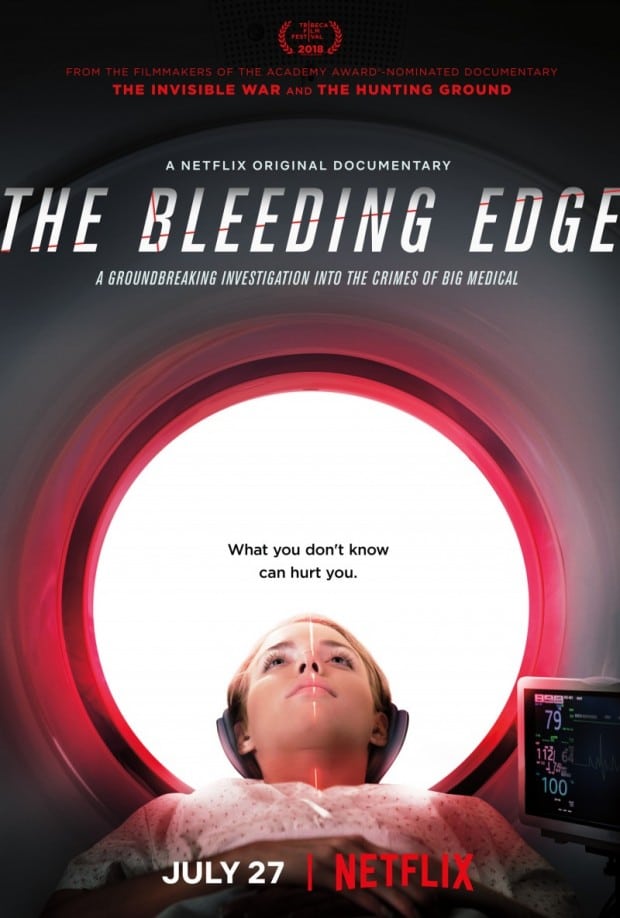The Bleeding Edge: Hard-Hitting Documentary Takes On The FDA
 An ambitious, daring filmmaker known for his willingness to target any organization, no matter how powerful, in order to give a voice to the powerless, documentarian Kirby Dick has sought out the ugly truth in films that have tackled a myriad of crucial societal issues. And now, in his new Netflix original documentary “The Bleeding Edge,” Dick attacks perhaps his most daunting opponent yet: America’s billion dollar Food and Drug Administration.
An ambitious, daring filmmaker known for his willingness to target any organization, no matter how powerful, in order to give a voice to the powerless, documentarian Kirby Dick has sought out the ugly truth in films that have tackled a myriad of crucial societal issues. And now, in his new Netflix original documentary “The Bleeding Edge,” Dick attacks perhaps his most daunting opponent yet: America’s billion dollar Food and Drug Administration.
“The Bleeding Edge” offers that, in the case of the American medical industry, “new” doesn’t always necessarily equate to “better,” and can oftentimes mean “harmful,” as the FDA’s eagerness to rush new devices to the market in the name of profits has caused irreparable damage, both physically and emotionally, for countless trusting patients.
To illustrate his point, Dick focuses on four recent medical devices that have spawned several documented cases of patients suffering harmful side effects: cobalt hip replacements, Johnson & Johnson’s vaginal mesh transplants for female incontinence, da Vinci Surgical System robots for facilitating complex surgeries and, at the documentary’s core, Bayer’s (recently recalled) birth control device Essure.
Interviews with several doctors, medical professionals, and even a current FDA employee who opted to have his likeness shadowed out and his voice modulated for his safety reveal how an antiquated medical device testing procedure known as the 510(k) submission process makes it almost laughably easy for new devices to reach the market. And due to both the unwillingness of some doctors to report problems with medical devices and the FDA’s desire to continue profiting off patients lured in by cutting edge technology, the process of having medical devices recalled from the market is, in stark contrast, a nearly impossible one.
Dick corroborates the troubling accounts of his assembled medical experts, which includes a doctor who himself suffered from poisoning resulting from a cobalt hip replacement, with extensive data obtained from recent medical reports. And Dick’s assiduous research is rendered even more alarming by the handful of videos Dick provides, which depict the powers that be at the FDA failing to perform due diligence during the testing process and faltering when challenged to justify their negligence in ensuing recorded interviews.
 But Dick’s most valuable asset here is his collection of interviews with real patients whose lives were essentially ruined by these highlighted devices. Seeing actual people and their loved ones stifle tears as they share one horror story after the next about the immense physical pain they suffered and the emotional trauma that resulted from it elevates the emotional stakes of the film to extraordinary heights.
But Dick’s most valuable asset here is his collection of interviews with real patients whose lives were essentially ruined by these highlighted devices. Seeing actual people and their loved ones stifle tears as they share one horror story after the next about the immense physical pain they suffered and the emotional trauma that resulted from it elevates the emotional stakes of the film to extraordinary heights.
Dick’s questionable narrative decision to shift the focus back and forth between the different medical devices instead of tackling each device one at a time occasionally makes it difficult to track which person is associated with which device.
But what matters most is that Dick has a wealth of jarring testimonials at his disposal, and each one is more devastating than the one preceding it.
For example, an unforgettable sequence shows a single mother, whose husband left her due to the strain that Essure’s side effects inflicted upon their marriage, moving her four kids out of the apartment she can longer afford due to healthcare costs, struggling to find a hotel within their budget, and ultimately being forced to leave her children in the care of a Church-based foster family.
And, in what is perhaps the most dynamic scene in the whole documentary, a former spokeswoman for Essure, who later suffered immense health complications from using it, attends a support group for other Essure victims and tearfully pleads with group for forgiveness. Watching the other women in the group clench their teeth in anger but nod sympathetically, knowing that their forgiveness of her is paramount–for me, that’s what documentaries are all about.
The sad truth underlying “The Bleeding Edge” is that Dick isn’t telling us anything about the FDA that we didn’t already know, or at least assume. But by providing incisive specifics, Dick has given the enemy a face, and in turn, has given the victims a much-needed voice.












